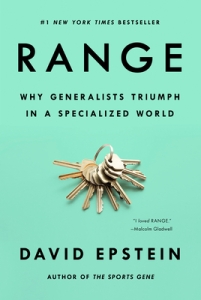Title: Range: Why Generalists Triumph in a Specialized World
Author: David Epstein
Genre: Sociology
Trigger Warnings: Death (mentions), injury (mentions)
Back Cover:
Plenty of experts argue that anyone who wants to develop a skill, play an instrument, or lead their field should start early, focus intensely, and rack up as many hours of deliberate practice as possible. If you dabble or delay, you’ll never catch up to the people who got a head start. But a closer look at research on the world’s top performers, from professional athletes to Nobel laureates, shows that early specialization is the exception, not the rule.
David Epstein examined the world’s most successful athletes, artists, musicians, inventors, forecasters and scientists. He discovered that in most fields–especially those that are complex and unpredictable–generalists, not specialists, are primed to excel. Generalists often find their path late, and they juggle many interests rather than focusing on one. They’re also more creative, more agile, and able to make connections their more specialized peers can’t see.
Provocative, rigorous, and engrossing, Range makes a compelling case for actively cultivating inefficiency. Failing a test is the best way to learn. Frequent quitters end up with the most fulfilling careers. The most impactful inventors cross domains rather than deepening their knowledge in a single area. As experts silo themselves further while computers master more of the skills once reserved for highly focused humans, people who think broadly and embrace diverse experiences and perspectives will increasingly thrive.
Review:
I am less than a quarter-century old, and I have a lot of experiences. I’ve published short stories in literary magazines, danced ballet en pointe, founded two businesses, and tried and left four religions. I’m teaching myself herbalism, Arabic, violin, and major world religions, and my resume includes a CNA license, forklift experience, web design, and running a commercial farm. But I couldn’t be called an expert in anything, or even more than an advanced beginner in most things.
In short, I’m a generalist. And since I was old enough to realize I didn’t have a single unequivocal answer to “What do you want to be when you grow up?” I’ve felt like I’m behind. I have not spent my entire life devoted to a single area of knowledge, I chose my college degree specifically because it was general and I could do almost anything with it, and my interests are so disparate that I can’t focus on just one thing without ignoring whole categories of things I enjoy.
I provide all this context not just because I like talking about myself (although I do), but to give some context for the emotional connection I felt towards this book. The main idea of Range is that early specialization does help for some fields, like chess, but for many areas, a “sampling period” where you try a bunch of different and unrelated things and specializing later once you find (through trial and error) what really speaks to you results in better creativity and skill in your field of specialization. And the book backs it up with hundreds of pages of studies and examples of late specialization leading to amazing skill, from Roger Federer to Vincent Van Gogh.
Range definitely isn’t perfect. Some of the examples meander until I lost the point or only seem tangentally relevant, the epilogue was almost entirely unnecessary, and I think it could stand to be at least 50 pages shorter. But I was very forgiving of all of that while reading because it told me I’m not hopelessly behind and gave me the science to prove it. If you are a generalist, feel like you’re behind and won’t ever catch up because you haven’t been practicing a skill since age three, or still don’t know what you want to be when you grow up even though you officially are “grown up,” this book will be an incredibly valuable read.

